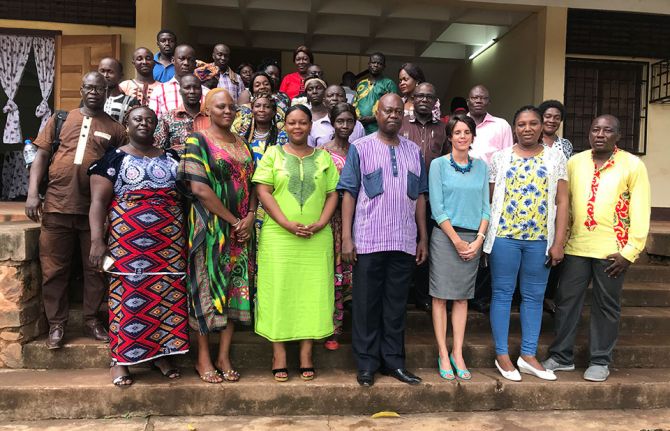

Feature Story
Adapting to keep people living with HIV taking their treatment in the Central African Republic
31 October 2021
31 October 2021 31 October 2021To counter the low level of people living with HIV in Central African Republic (CAR) on treatment, the country has been testing new treatment approaches.
One is distributing up to 6 months of medicine, known as multi-month dispensing. The other is community ARV dispensation. CAR’s 2021-2025 National HIV Strategic Plan, identified these differentiated approaches at the community and hospital level and has been trying it out.
In the capital, Bangui, four pilots opened and 15 sites will progressively offer MMD (multi-month dispensing), health check-ups and community outreach thanks to funding from the Global Fund. This follows on the success of community-based treatment groups (CAGs) introduced by the Ministry of Public Health and Population and the National AIDS Control Council (CNLS) in 2015, with the support of the NGO Médecins Sans Frontières.
Certain community members deliver antiretroviral treatment to people living with HIV, especially in rural or conflict-stricken areas. Results showed that treatment intake was much more regular and people living with HIV had a rate of 75% viral suppression.
In addition, with UNAIDS support under a Luxembourg grant, the country has set up a steering committee to oversee the scale up of differentiated services, developed and validated national guidelines on the provision of differentiated services and two guides on multi month dispensing and the possibility of getting refills in a non-hospital setting.
At the end of October, clinicians, lab technicians, health care providers, community health care workers from the four pilot health centers participated in a workshop to go over the new approaches and guidelines. The CNLS and the country’s Division of Communicable Disease Control (DLMT) were confident adapting to the HIV epidemic in this way was a right step to keep patients on treatment. Currently, less than half of the people living with HIV take life-saving medicine (88,000-100,000 people live with HIV in CAR.)
Dr Marie-Charlotte Banthas from the DLMT said that "differentiated treatment models have demonstrated consistent improvement in patient engagement and retention of care, while freeing up time for the care of people with advanced disease.” She then added, ”It's a model of care for people living with HIV and staff working in the HIV field, a model of life."
These approaches came at the right time considering the lockdowns due to COVID-19, remarked UNAIDS CAR Country Director a.i. Marie Engel.
"With the long projected trajectory of the Covid pandemic, there is an even greater need to adapt the system to reduce service disruptions and not have recent gains in the HIV response stymied,” she said.



